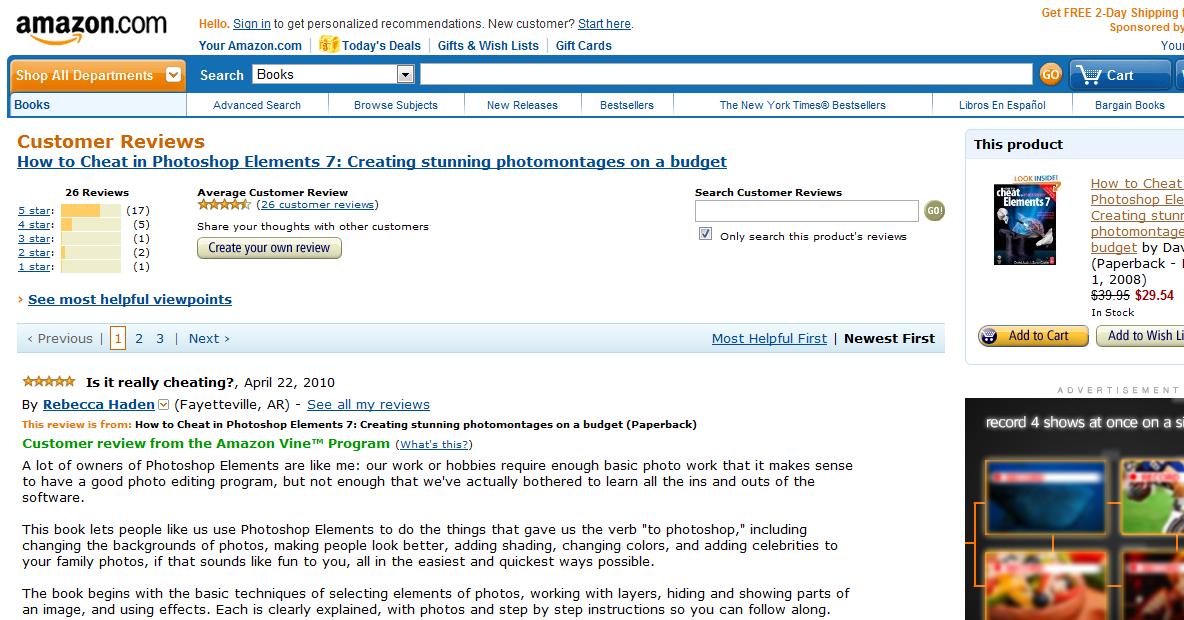Who do you trust more: a paid ad for a company or your friends and people like you? The vast majority of people trust unsolicited reviews more than paid ads. The internet lets us all get out there and speak our minds. Reviews and review sites are therefore growing in importance.
If you have a product, there are plenty of places where you can review it. Amazon.com is among the most trusted businesses, and they’re selling the stuff, so you should certainly make sure to have reviews there if you have products there. I get emails telling me that I’m a major business book reviewer there and asking me to review books. Frankly, I don’t know where the senders get this idea, but if I had products at Amazon, I’d ask them for suggestions of people to ask for reviews. I’d also ask my linkbuilders to check out my products and review them.
Lunch.com is another user-content review site, and you can place links there, too. You can review absolutely anything at Lunch, including all types of goods and services. It should be on your linkbuilding list, for sure.
Yelp.com, Judy’s List, and local directories are all places where you can review local businesses. I’m not that impressed with the accuracy of Yelp (they won’t allow me to change my phone number from a number that is currently out of service to the one on my website, for example), but it is certainly the most popular of its kind. This type of site will allow you to place a link and to write reviews.
Once you’ve completed the open review sites, you can contact bloggers who review goods and services like yours, and ask them to have a look at your stuff and see whether they’d care to review it. Remember that bloggers are now required to tell if they’ve been paid to write a review, so offering payment shouldn’t be your first choice. Persuading the reviewer that your stuff is worth reviewing would be the best bet.
Whether you place reviews on review sites or ask people to review your stuff, the more reviews you have, the better.
How can you get reviews?
- Ask your customers. When a customer tells you how great you are, ask her if she’ll go say the same thing at Yelp. Ask your friends and family, too. Swap reviews with your strategic partners.
- Give out samples. When I review a place for a magazine article, I pay my own way and take it off my taxes. But I review a lot of books and software sent to me by the manufacturers. My reviews are honest, of course, but it works better for the manufacturer than waiting around and hoping I notice their stuff would.
So how do you make sure that your reviews do the job you want them to do?
- They should be well-written. Whether it’s a conscious decision or not, we are more likely to read, believe, and respect well written opinions than poorly written ones. If there are lots of obviously unsolicited reviews, the numbers can overcome that tendency. If you’re asking for reviews, though, you should choose people who are likely to write well.
- They must be sincere. I see want ads for writers to churn out quick reviews of things they’ve never experienced. This is wrong. It also doesn’t fool people. 18 variations on “This is the best stuff I’ve ever tried!” will not move people the way one sincere, detailed review will. You may also find yourself blocked from sites or otherwise punished for cheating. And of course there’s the whole honesty and decency aspect.
- Details are good. I added the tesimonial, “You rock!” to my collection of testimonials because it made me smile, but I think we all know that people are more persuaded by the one that says I helped the business grow and the one that says my copy was brilliant and I completely understood their business and the one that says I took them from PageRank 0 to PageRank 3 in a matter of weeks. Get some specific information into those reviews.
If you ask people for their honest opinions, you will get some negative comments, too. However, this will make your positive reviews more convincing by showing that you’re not writing them all yourself. And one person’s negative can be another’s positive — that comment saying that your restaurant was raucous and noisy may draw exactly the crowds you want.



Leave a Reply